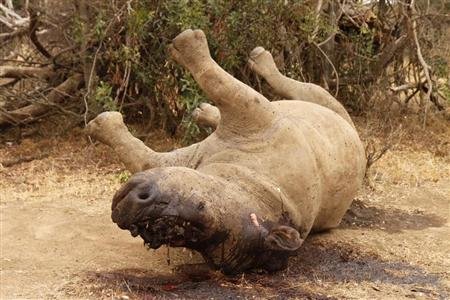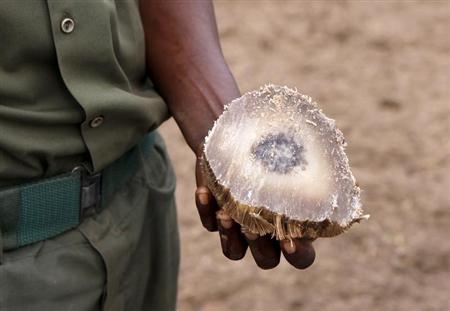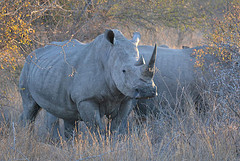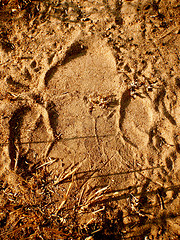By Jon Herskovitz (with an editorial by Joe Kreuzman)
KRUGER NATIONAL PARK, South Africa (Reuters) – Five days after the rhino was gunned down, its carcass had been picked apart by scavengers while the poachers who killed the threatened animal had probably taken its valuable horn over the South African border into Mozambique.
All that was left of its calf was a skull swarming with flies and a few other bones collected by crime scene investigators at South Africa’s flagship Kruger National Park for DNA tests that may one day be used to link the poachers to the stolen horns. South Africa, home to almost all rhinos on the continent, has deployed its military, diplomats and police to protect the animals from legions of poachers. But that has not been enough to put rhinos on the brink of species decline, whereby more of the animals are being killed than are being born each year…. (Continue Reading- with below link)
“We are fighting a counter-insurgency now. The war is escalating. It is more aggressive and there is more firepower,” said Johan Jooste, a retired army major general tasked with militarising Kruger’s park rangers.
South Africa is on pace to lose 812 rhinos this year to poachers. Most of them come over the border from Mozambique and sell the horn to international crime syndicates to feed rapidly rising demand in Southeast Asia, where the horn is thought to cure cancer and tame hangovers. That figure would set a record although it would still not be enough to lead to species decline. However, more than 1,000 rhinos would be killed in 2014 if the poaching rate increases at its current pace. That would mean about five percent of South Africa’s rhino population would have been gunned down for horns sold to the newly affluent at pharmacies in places like Hanoi at prices higher than gold.
“The rate of poaching continues to rise and we are getting ever closer to that dangerous tipping point,” said Jo Shaw, the rhino coordinator for the global conservation agency World Wildlife Fund (WWF).
WIPED OUT
One rhino expert, Richard Emslie, sees the tipping point coming in 2015 under current trends. South Africa’s environment ministry forecasts from 2016, and once that happens, wild rhinos could be wiped out in the country a decade after that. Rhino horn has been used for centuries in Chinese medicine, where it was ground into powder to treat a range of maladies including rheumatism, gout and even possession by devils.
Up until about 2010, only a handful were poached but the number shot up when rumours circulated at about the same time in Vietnam that a minister’s relative was cured of cancer by rhino horn. There is no basis in science to support the claim. Kruger, a park that covers as much territory as Israel, is at the front line of the battle, but its enormous size has played into the favour of poachers. To reach the carcasses of the mother and calf required a two hour hike from the nearest dirt road. It is hard to find a poacher in a vast expanse where disappearing in tall grass is as easy for a leopard as it is for a man with a high-powered rifle.
“Once the poachers fire a shot, they are detected and they have to get the horn across the border as soon as possible,” said Frik Rossouw, an environmental management inspector for the park leading the investigation on the rhino cow and calf.
Poachers are usually from poor border villages lured into the trade by crime syndicates, which then transport rhino horn out of Mozambique along the same routes used to bring in drugs from Southeast Asia. Poachers come in groups of about two to five, with enough food and water for the trip and enough firepower to gun down the animals as well as battle rangers with military assault rifles. Some poachers try to hide the sounds of their rifles with silencers, but that can reduce accuracy and make it more likely they will go home with nothing.
“The horn on the calf weighed about 1 kg, not all that much, but it doesn’t matter for the poachers. Any rhino is fair game for them,” Rossouw said.
FENCING OFF THE NEIGHBOURS
His investigation is a dirty and smelly business, searching for bullets with metal detectors and reaching into the carcass to rip ribs out of the decaying animal for DNA tests.
The idea is to find the poachers before they find the rhinos. To do this, the National Park Service has enlisted the help of police, customs agents and ex-members of the apartheid-era military to train new rangers to fight in the bush. Once fresh signs of a poacher incursion are found, the park dispatches an armed interception team by helicopter. Rangers with a search dog are dropped off on the ground while the helicopter with a sniper on board keeps watch overhead. If rangers are lucky, they can arrest a member or two from a poacher gang. Most poachers escape to try again while a few are shot every month in battles with rangers.
South Africa has been imposing stiffer sentences for poaching, with recent convictions leading to 10 to 15 years in prison. However, in Mozambique, poaching is still a minor crime where prosecutions are rare. South Africa and Mozambique started knocking down sections of the border fences in Kruger about a decade ago to give animals more area to roam. There are voices in South Africa now calling for it to be rebuilt to protect the rhinos on its side.
“We are dealing with people at the bottom,” anti-poaching commander Jooste said of the poverty that drives people into arms of international syndicates for the rhino horn trade.
“They are treated as cannon fodder and they are unlimited.”
Editorial by Joe Kreuzman: Apologies for the above graphic picture but this is the fate of too many animals in the wild. The Trackers on the ground in South Africa tell me in a decade all wild Rhinos will be gone. The official count of 21,000 Rhino uses flawed and outdated methods for estimating how many animals exist in the wild and is not accurate. The Trackers who walk the land everyday, not drive but walk, tell me 10,000 animals exist. These remaining Rhino are being “saved to death” meaning the value of Rhino horn has been inflated due to the laws and policies making this an illegal trade. A local point of view from those who live and work in the Field of conservation in South Africa is to permit a steady and safe supply of the medicine to Asia while doing no harm to wild populations of Rhino. South Africa allows for private storage of horns, which must be registered. Countless tons of categorized and DNA tested Rhino horn exist in secure vaults. The measured and regulated release of horn would drive the market value down and virtually end poaching overnight. It would be highly regulated like any medicine, would raise large sums to further protection and conservation efforts across species and would produce income for game reserves. This would make the Rhino more valuable alive than dead and the local people would see the value in protecting not only the Rhino but many species. Presently Rhino horn sells for $65,000 a kilogram, making it more valuable than gold.
Tell us what you think and add your comments?
A ranger shows part of a Rhino horn after the Rhino was dehorned by a veterinary surgeon to prevent poaching at the Kruger National Park in Mpumalanga Province September 16, 2011. Reuters/llya Kachaev
3 Rhino a group of us tracked on the “SA Deer Trail” August-2012
A photo I snapped of the anti-poaching patrol mentioned in the above story
In a decade: will trackers be able to see this in the Wild?






terribly sad,but preventable if they change the national park to an endangered species preserve. then they have the right to search and detain threats.
LikeLike
I think we should stop the propaganda that is saying how many rhinos there are left
LikeLike
It’s shocking that over 300 rhinos this year have already been killed. The idea that legalizing rhino horn is still controversial but I believe it could save the rhino. I’ve heard about the ‘saved to death’ idea concerning other endangered animals before. It’s such a neat idea to legalize rhino. If they could meet the demand by simply cutting off the horn and not killing the rhino it would not only be saving the rhino but ending the illegal market.
LikeLike
The saddest thing for me is that more rhinos are dying than being born each year. “The rate of poaching continues to rise and we are getting ever closer to that dangerous tipping point,” said Jo Shaw, This is very sad but also very true.
LikeLike
I am glad people decide to try and help rhinos. It’s sick to kill them just for the horn and leave the body wasted. People these days will do anything for money.
LikeLike
I agree that its crazy and horrible that people can kill such amazing creatures just fir money. It mind blowing that rhinos are being poached so much that they could possibly be extinct in a decade. i think if there are better laws and rules and more restrictions to these animals, the poaching will decrease and hopefully stop over time. These animals are too beautiful to be gone forever.
LikeLike
If you create tougher laws, the poacher will find other ways to still break them and get to the Rhinos. It will also drive up the cost of the horns creating more poachers. Maybe they can do a chemical reaction and see if they can create a material exactly as the rhino’s horn. The people then would buy this cheaper material and get the same benefit out of it. So there would be no reason to poach the rhinos.
LikeLike
In order to prevent poaching when entering the park visitors should be searched and any weapons that are found should be confiscated and the owner of the weapon should have to pay a fine in order to get it back. Naturally,the poachers would complain that this is a violation of their rights and claim that it was for their protection. The park should then say that if they are concerned about protection then they should stay in the vehicle with windows and doors closed at all times. Any fines collected should be used to pay the guards for their services
LikeLike
Also, how could anybody be so stupid as to believe that rhino horns cure cancer. If someone were to really want to know if rhino horn really cured anything they should either request that scientists do such an expirement, only allowing ten horns to be used, or they should just not try it.
LikeLike
In order to stop rhino poaching in places like Kruger Park guards should be hired to search anybody entering or exiting for weapons and if any are found they should be confiscated and potentially band from entering the park again.
LikeLike
Sad to knoe that in a couple of years they may be gone. The poachers don’t realize what they are going to do when they are extinct
LikeLike
Its truely sad that these beautiful, magestic, and powerful animals are being poached for their horns. 1 ,let alone 812 rhinos, is too many killed.
LikeLike
Sadly, Jo Shaw from WWF was right, if the poaching rate continues and heightens, we will get to the dangerous tipping point of rhinos being an endangered species. I believe there needs to be better protection, service from the poaching, and we need to breed more wild rhinos to keep the population healthy for all the wildlife.
LikeLike
I think it’s terrible that within a decade, rhinos might go extinct. It’s disturbing that over 800 rhinos have been poached, despite increased security attempts.
LikeLike
*poached in 2012. Also, why do people believe that rhino horns cure cancer? There is absolutely no scientific evidence to support this. You would think they might have already expirimented this already, and if not, isn’t most of a rhino horn made of keratin? That’s the stuff our fingernails are made of. Wouldn’t it be easier to extract keratin off of recently dead humans anyway?
LikeLike
It is horrible that the rhinos are only being killed for there horns. it is crazy so many of them are being killed in South Africa. I have a couple of questions: why are they just killed for there horns? i hope that when i go to South Africa I can see some Rhinos in the wild because i went to the wilds in Ohio and was up close to ones that were bread in captivity. I twas such a cool experience.
LikeLike
It is a horrible thing that these poachers are killing beautiful creatures. I cannot believe that 812 rhinos could be possibly killed this year if we keep up with the pace of the poachers. Nobody can stop the poachers but themselves, and hopefully they come to realization before its too late. The 65,000 dollars is no excuse to killing the creatures of God for your own benefit.
LikeLike
These statistics blew my mind. I don’t get a how a person can be so evil as to kill an endangered animal just for cash! I wish that the poachers would realize that the rhino’s will be extinct in not even a decade. Now I get that dehorning a rhino is a good solution but don’t the rhino horns grow back back?
LikeLike
I learned the threats of the poachers in this article and what the horns are used for and by who. These are some of the author’s word to word facts I directly pulled out of his article.
*Poachers who killed the threatened animal had probably taken its valuable horn.
*South Africa, home to almost all rhinos on the continent.
*Africa is on pace to lose 812 rhinos this year to poachers.
*More than 1,000 rhinos would be killed in 2014 if the poaching rate increases at its current pace.
*Horns are sold to the newly affluent at pharmacies in places like Hanoi at prices higher than gold.
*Has been used for centuries in Chinese medicine, where it was ground into powder to treat a range of maladies including rheumatism, gout and even possession by devils.
LikeLike
It is a problem that rhinos will be gone. For the rhinos to be saved the ivory market needs to be destroyed. If there is no market for poachers, poachers will stop killing animals such as rhinos.
LikeLike
This is a horrible thing to do. I can’t believe 812 rhinos are to die if we keep up with the pace of poaching. Now that I have seen (and petted) a rhino and really observed its environment and its habits I realize just how beautiful this creature is and cannot imagine how poachers can overlook these traits and destroy a creature in which God made. 65,000 dollars (per kilogram) is not enough money to slowly make a magnificent animal decease. I hope these poachers open up their eyes and stop before its too late.
LikeLike
I was so surprised to see that 812 Rhinos could be killed this year! That is so unfortunate. People who kill these magnificent creatures for their horns are greedy. $65,000 per kilogram may be a lot of money, but people can earn their money more justly than that. I wish people could see that. I really hope that rhinos don’t go extinct; but until poachers stop what they are doing, we never know how long we have with these beautiful animals.
LikeLike
It is absolutely crazy and sad that rhinos will be gone in a decade, in the wild, if poaching rates continue the way they are. I do have a question where is the most poaching of rhinos happening in south Africa?I do believe that is important that people are trying to stop poaching! Also I saw the picture of a dehorned rhino alive. If they are in national parks or reserves do they remove there horns? If they do dehorn them I totally agree it then gives poachers a lesser chance to kill for horns!
LikeLike
Its sad to know how much rhinos are being killed just for their horns. But it is also good to know that there are people out there trying everything they can do in oder to help these animals before its to late.
LikeLike
Nature awareness education awakens compassion and empathy for all life It literally rewires the human mind to value the environment as one would value their own life.
LikeLike
This is a bit like preserving the amazon in the sense that an impoverished and ignorant population will engage in all sorts of criminal activities to make money to feed themselves. Including destroying a forest that will soon become a desert. The war has to be won elsewhere, meaning, the international market for rhino horns, wood etc.
LikeLike
Last week I actually gave a big presentation on African elephant and rhino poaching for one of my classes. After doing a lot of research, one thing is sure, this issue is extremely complex.
For example, what Joe said about making the rhino horn trade legal to stop poaching is a really good idea in theory, unfortunately when put to the test, it might not hold up. They tried it with elephant ivory trade with terrible results. Ivory trade is illegal, but exceptions are made every now and then. Only a few countries are authorized to buy the ivory. In 2008 China was authorized to take part in an ivory auction. Here’s what went down. First, before the auction the other big buyer, Japan, made a deal with China that was basically agreeing not to compete with each other. So the auction ended up selling their ivory for a very low price, limiting the money that would go to conservation. But still, in theory this would be good because there would be a flood of legal ivory on the market at a low price, which should put poachers out of business. China got the ivory for $67 a pound while illegal ivory was going for about $380 a pound. This would be perfect. But…
Then China turned around and marked up the price of the ivory by 750%, selling it for $500 a pound. More than poachers had been getting! Not only that, but China made a 10-year plan over which they would slowly release the ivory to the public. China actually increased the monetary incentive to poach and made a plan under which incentive would remain high for at least 10 years.
But the legal trade definitely has potential. That is, if everyone gets on board and commits to the wildlife instead of the money.
Education is also very important. Most consumers of ivory and horn probably don’t realize what it means for those animal populations. I read one account of a Chinese student who was horrified to hear that they actually killed the elephants for their ivory and didn’t just saw it off.
LikeLike
Whew… I totally believe the trackers # over than the estimated # of the “official count.” They are the ones communing with the rhinos, walking with them day to day.
Kersey, I had never heard of those methods of detracting the poachers. Hoping some of them like the dye methods are working, seeing tangible results. It’s one small step in the right direction.
Joe, thanks for sharing the article and the intel from the trackers you guys worked with. First hand knowledge/experience really hits home more-so than a vague picture of what’s going on.
It’s incredible the great lengths that people will take even when the pay-off is little and/or comes at a great cost to others.
Definitely all good food-for-thought.
LikeLike
Many reserves are dehorning their rhinos (sawing off the horn) but this doesn’t always discourage poachers – they shoot a rhino that they spent all day tracking just so they won’t waste their time tracking it again, or they kill it for the little bit of horn still left on the skull. In the Sabi Sand region of Greater Kruger, rhino horns are being infused with a non-lethal chemical mixture designed to sicken anyone using it as a “traditional medicine”. A key additive to the Sabi Sand treatments is an indelible pink dye which exposes the presence of smuggled horns on airport scanners worldwide and warns consumers that the ground-up product is hazardous.
I am excited for those students going with Sandy to South Africa – once you sit with a rhino it enters a space in your heart and lives there – then you will understand the importance of protecting it.
LikeLike
The fact that the poachers that are hunting these rhinos would kill even those that have little to no horn material actually on them is very telling of how incomplete the ‘bigger picture’ is within their view of the rhino’s importance; it is more than sad that they merely view the rhinos as a resource to be killed and mostly left to rot, while they make off with a valued material that is valued so much. Not only is the animal being dishonored and its species truly dying, but the horns will not be reproduced again if the rhinos die off anyhow…so curing people of cancer is clearly not the central thought guiding the poachers, this supporting then, and their actions…greed likely plays an unfortunate part in this, in one form or another.
That being said, is there anything that could be done to use the idea of ‘preserving the rhinos for their horns’ to get people from the parts of Asia in which consumers live to also help preserve the population? I would think that, as thwarting number of rhino horns, and therefore rhinos, dwindles, consumers woykd not want the ‘resource’ to vanish…can this be taken advantage of to save the rhinos of Africa at all?
LikeLike